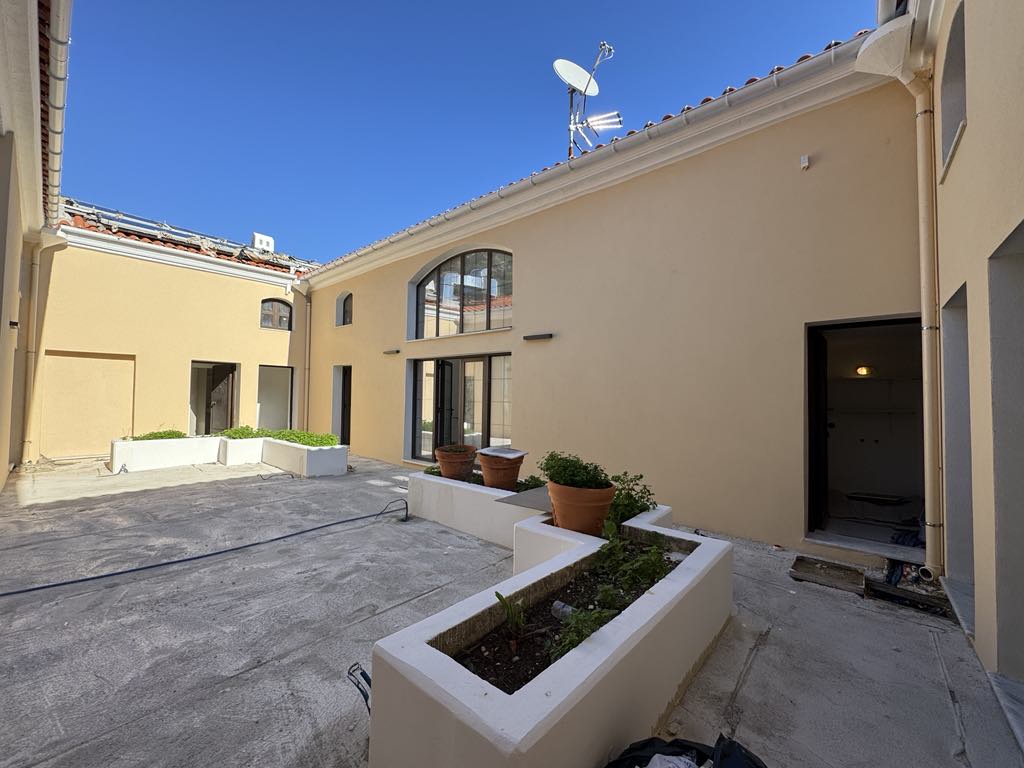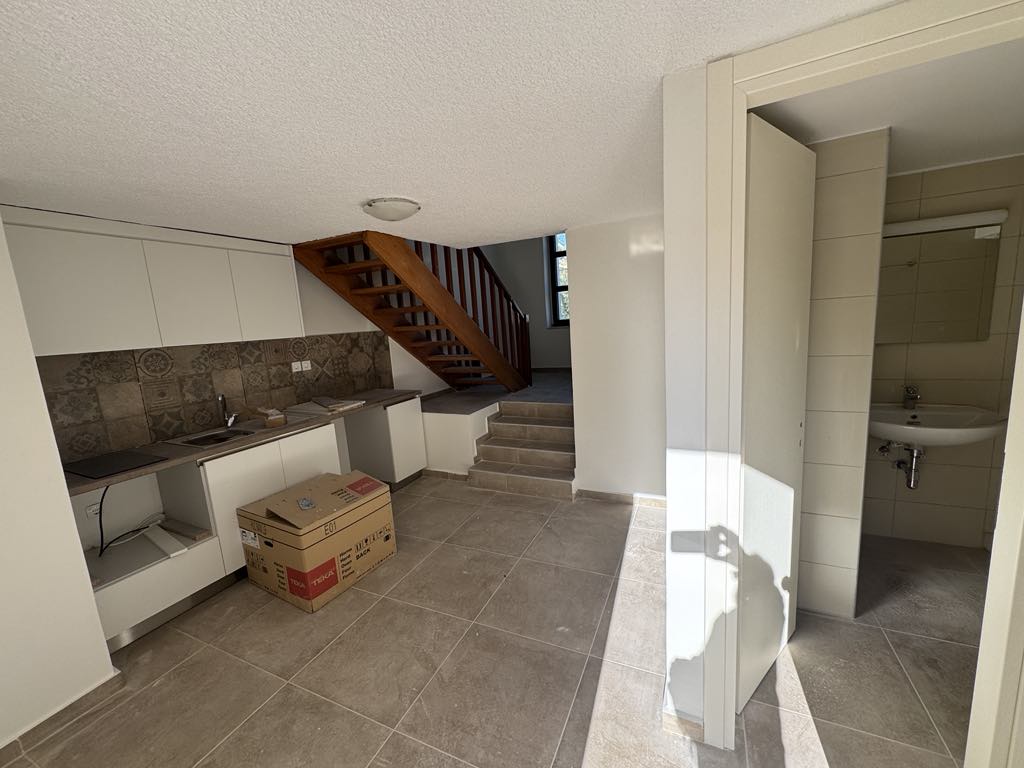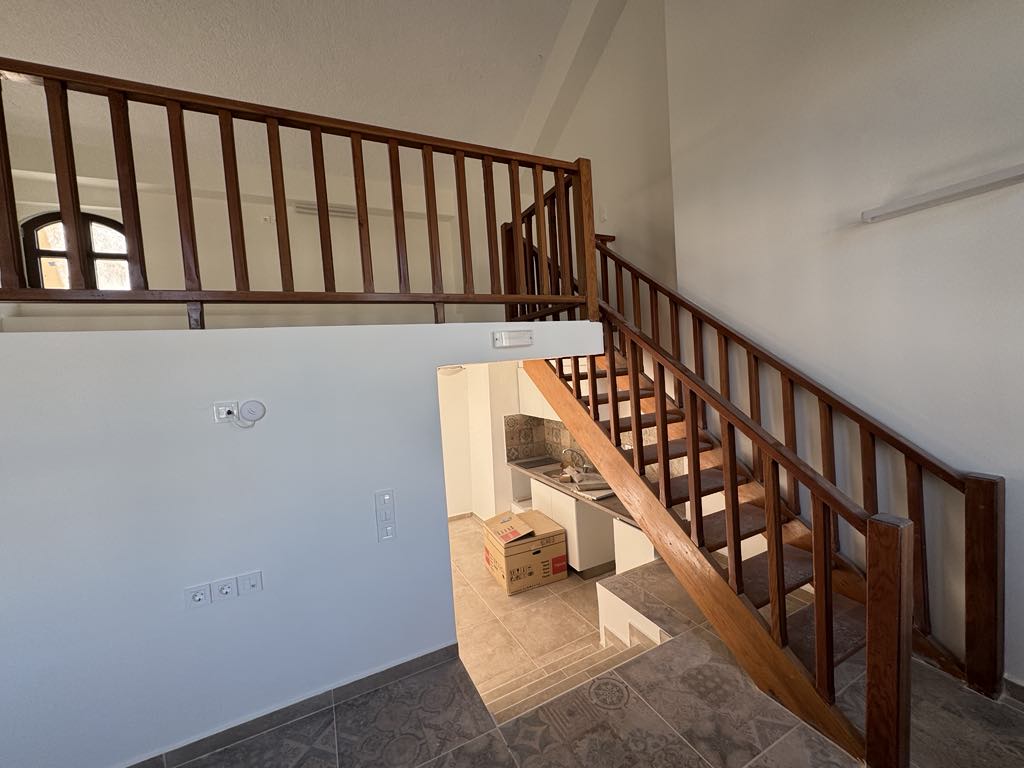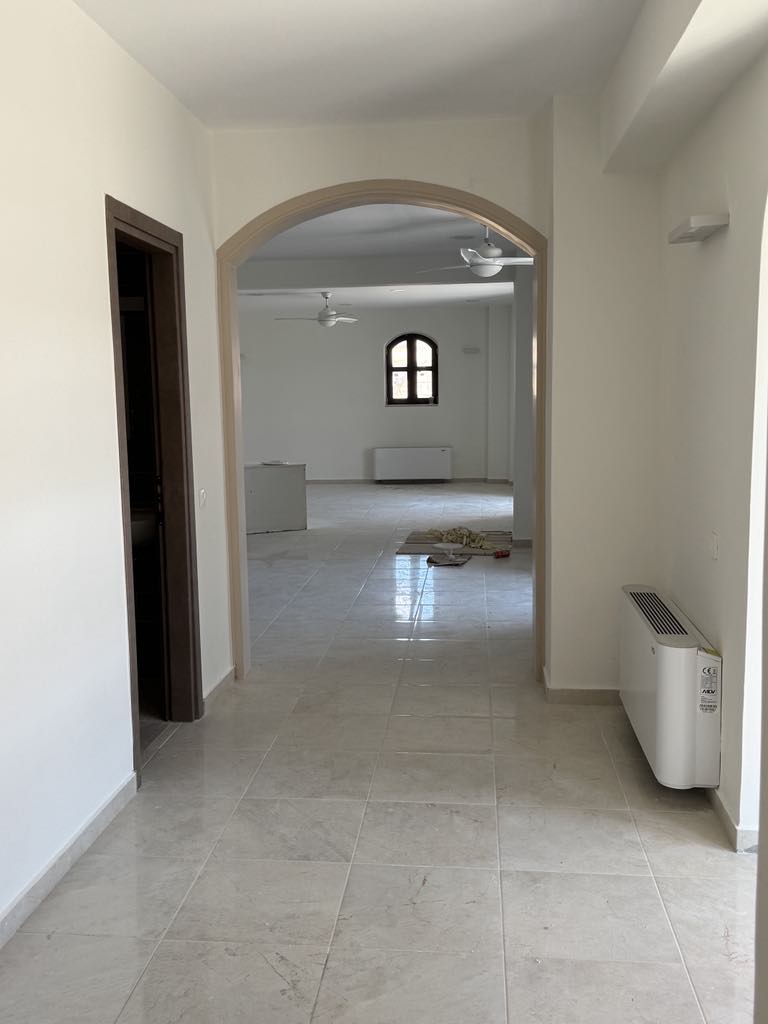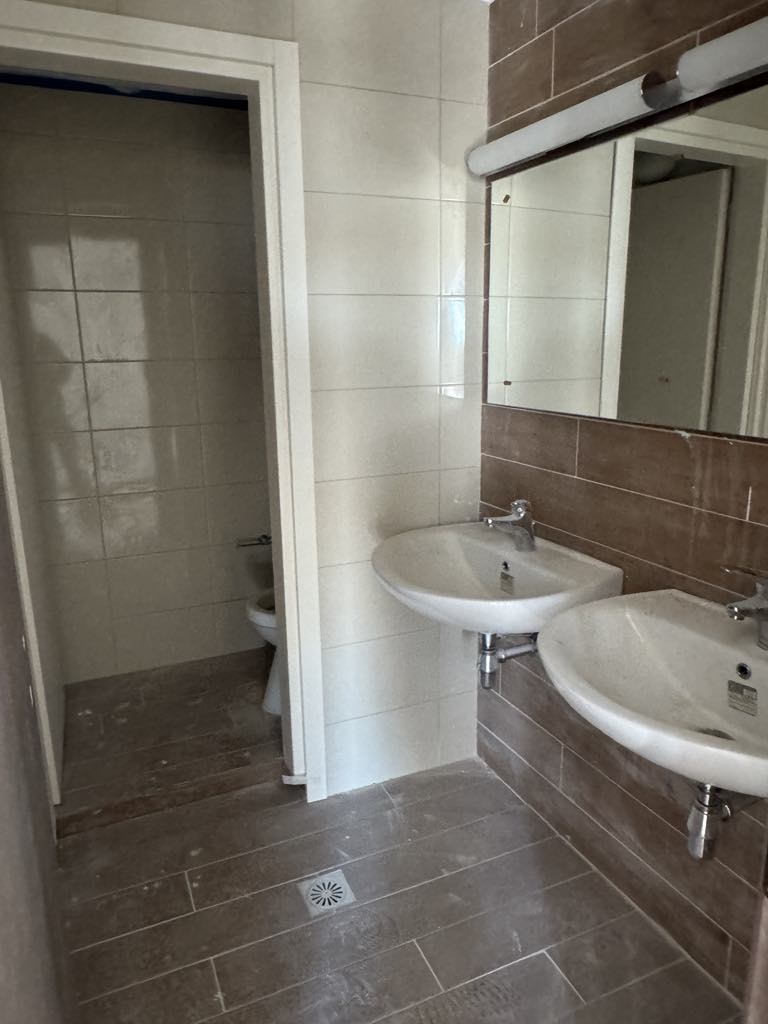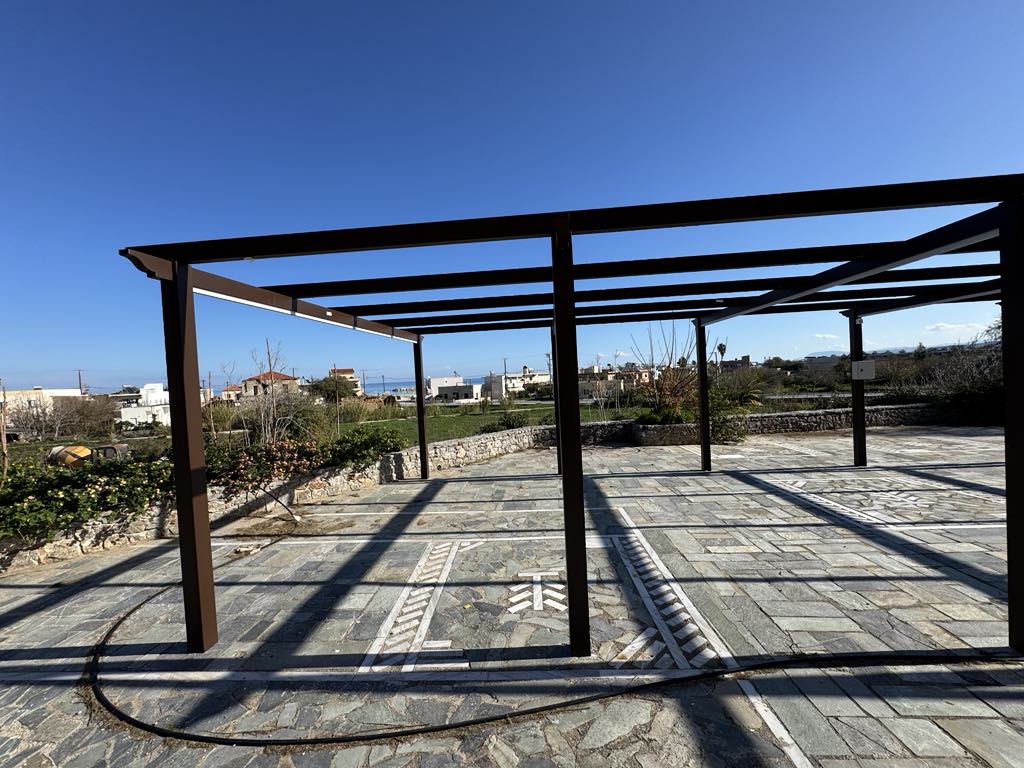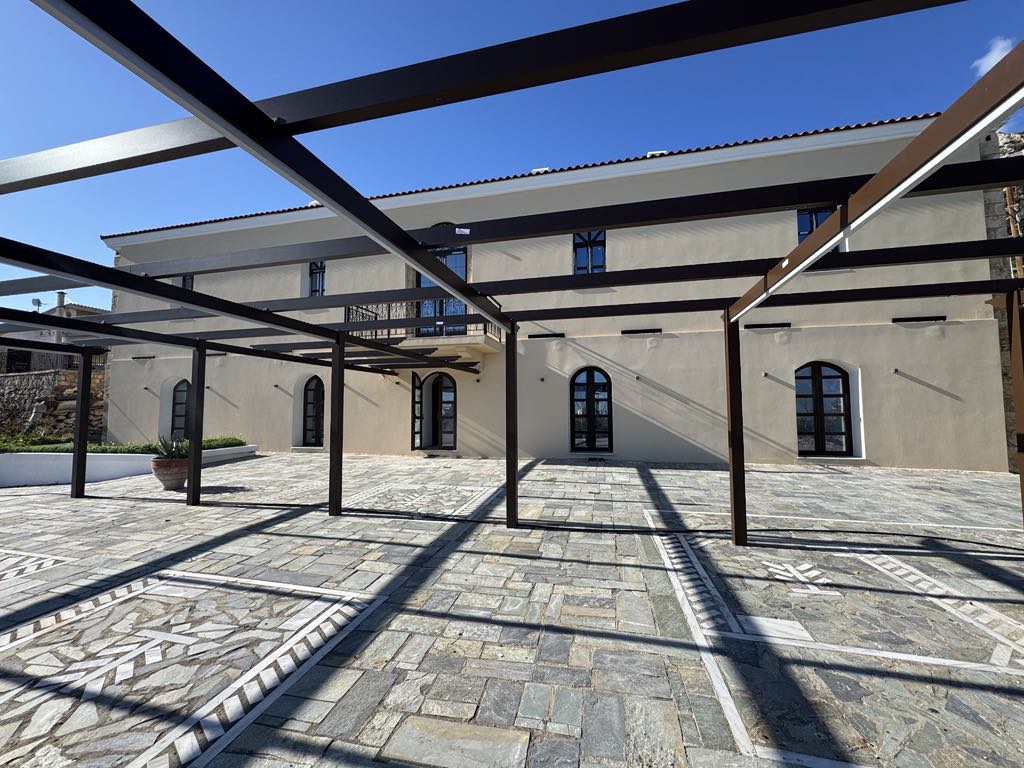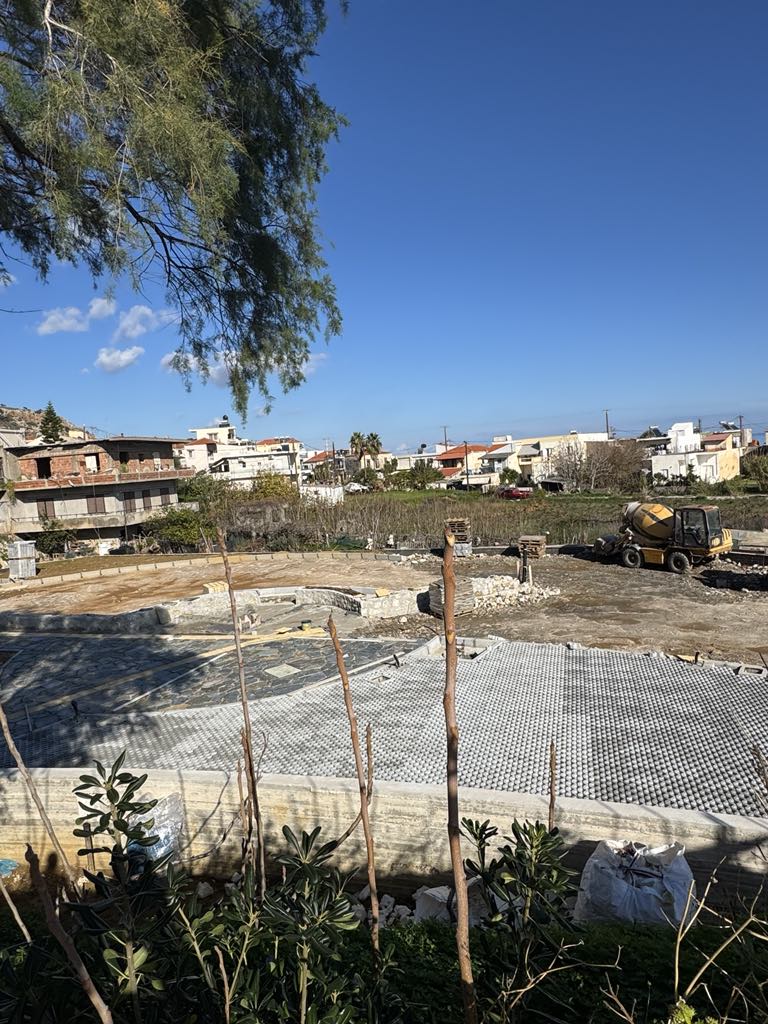MUNICIPAL GUESTHOUSE "DIKTYNNA"
Renovation and Energy Upgrade of the municipal hospitality guest house "DIKTYNNA" "DIKTYNNA"
The "DIKTYNNA" initiative is a model of sustainable and socially conscious public building renovation, combining energy efficiency, aesthetic quality, and social cohesion.This project is not just about renovating a building but about creating a new approach to social policy, energy, and architecture, focusing on both people and the environment. It intersects the repurposing of a municipal building with a change of use while innovating and preserving the architectural aesthetics
Greece
Municipality of Platanias, Crete Region, Greece
Early initiative
Yes
Yes
Yes
No
No
74060112: Municipal Commune of Platanias (EL)
The initiative concerns the renovation and energy upgrade of the former Kolymbari Municipal School (a municipal unit of the Municipality of Platanias) into the modern hospitality guesthouse "DIKTYNNA" of the Municipality of Platanias. The project aligns with the municipality's strategy to reduce its carbon footprint by leveraging contemporary energy-efficient solutions and modern energy systems. The objective is to create a safe, sustainable, and accessible accommodation facility that ensures dignified living conditions for its guests while contributing to the municipality's overall environmental policy. The Municipality of Platanias has a targeted commitment to reducing carbon dioxide emissions and achieving energy savings, as it has been a member of the Covenant of Mayors since 2013. Today, such initiatives are imperative for an additional reason—financial resource conservation. Given current pricing by energy providers, the financial burden on the municipal budget is asymmetrical and unsustainable. Within this framework, the municipality has undertaken a series of studies in recent years, utilizing new institutional tools in accordance with recent legislation. This includes the development of the Energy Efficiency Action Plan and the nearly completed Building Energy Efficiency Plan assessing and prioritizing the necessity of interventions in municipal buildings. Subsequently, maintenance and energy studies were conducted on the most energy-intensive municipal buildings in two phases including schools and municipal halls. Within this framework, the Municipality of Platanias is submitting, for the first time, a proposal for funding under the "New Bauhaus Boost for Small Municipalities" initiative, which specifically concerns the renovation and energy upgrade of the "DIKTYNNA" hospitality guesthouse.
Energy Upgrade
Social Inclusion
Sustainability
Accessibility
Innovation
The initiative focuses on the sustainable renovation of the "DIKTYNNA" Hospitality Center, creating a safe, functional, and energy-efficient facility. The project involves structural repairs and modernization, promoting social cohesion and improving living conditions.
Key Sustainability Goals
1. Energy Efficiency & Environmental Impact Reduction
-Implementation of energy upgrades, including thermal insulation, replacement of window frames, and heat pumps to reduce energy consumption and CO₂ emissions.
-Adoption of Net Metering technologies and a Building Management System (BMS), following municipal best practices.
2. Safety and Hygiene Improvements
-Structural reinforcements, including concrete restoration, enhance building stability.
-Upgraded plumbing and sanitation facilities ensure hygiene and well-being.
3. Social Sustainability & Intergenerational Living
-Creation of an inclusive hospitality model fostering collaboration across age groups.
-Accommodation for vulnerable social groups to support integration and broader social inclusion.
Implementation Strategies
• Infrastructure & Electromechanical Upgrades: Renovation of insulation, walls, and spaces; replacement of doors and windows with energy-efficient alternatives; installation of heat pumps.
• Green Technologies & Renewable Energy: Installation of photovoltaic systems with Net Metering, solar panels, and an automated BMS for optimized energy use.
• Human-Centered Approach: Providing a safe and welcoming space while fostering social cohesion and sustainability.
A Model for Sustainable Hospitality
The "DIKTYNNA" initiative integrates social and energy sustainability, reducing operational costs and supporting municipal development. It serves as a replicable model for sustainable renovation and management of social infrastructure.
Key Sustainability Goals
1. Energy Efficiency & Environmental Impact Reduction
-Implementation of energy upgrades, including thermal insulation, replacement of window frames, and heat pumps to reduce energy consumption and CO₂ emissions.
-Adoption of Net Metering technologies and a Building Management System (BMS), following municipal best practices.
2. Safety and Hygiene Improvements
-Structural reinforcements, including concrete restoration, enhance building stability.
-Upgraded plumbing and sanitation facilities ensure hygiene and well-being.
3. Social Sustainability & Intergenerational Living
-Creation of an inclusive hospitality model fostering collaboration across age groups.
-Accommodation for vulnerable social groups to support integration and broader social inclusion.
Implementation Strategies
• Infrastructure & Electromechanical Upgrades: Renovation of insulation, walls, and spaces; replacement of doors and windows with energy-efficient alternatives; installation of heat pumps.
• Green Technologies & Renewable Energy: Installation of photovoltaic systems with Net Metering, solar panels, and an automated BMS for optimized energy use.
• Human-Centered Approach: Providing a safe and welcoming space while fostering social cohesion and sustainability.
A Model for Sustainable Hospitality
The "DIKTYNNA" initiative integrates social and energy sustainability, reducing operational costs and supporting municipal development. It serves as a replicable model for sustainable renovation and management of social infrastructure.
The renovation of the "DIKTYNNA" Hospitality Center in the Municipality of Platanias aims to improve infrastructure, energy efficiency, and aesthetics, creating a welcoming and functional space. The design prioritizes functionality, visual harmony, and cultural identity, fostering well-being and social cohesion.
Key Objectives:
1. Creating a Warm Environment
-Use of natural materials and colors to enhance familiarity and reduce the sense of temporariness.
-Design promoting tranquility, security, and social interaction.
2. Aesthetic and Functional Upgrade
-Renovation of facades, interiors, and structural elements to eliminate signs of neglect.
-Integration of modern and durable materials for a timeless appearance.
-Energy-efficient windows and lighting to improve comfort.
3. Enhancing Cultural Identity
-Incorporation of traditional architectural elements respecting local heritage.
-Creation of communal spaces promoting interaction and cultural engagement.
Implementation Strategies:
• Use of high-quality materials ensuring longevity and aesthetic harmony.
• Optimized natural lighting and thermal comfort through bioclimatic design.
• Development of green spaces for relaxation and well-being.
• Ergonomic furnishings enhancing comfort in shared and private areas.
Model for Future Applications:
This initiative sets a precedent by combining aesthetics and sustainability to improve living conditions in hospitality centers. The integration of cultural identity and social design principles makes it a replicable model, contributing to enhanced quality of life and community inclusion. Success will be measured through improved resident experience, safety, and social acceptance.
Key Objectives:
1. Creating a Warm Environment
-Use of natural materials and colors to enhance familiarity and reduce the sense of temporariness.
-Design promoting tranquility, security, and social interaction.
2. Aesthetic and Functional Upgrade
-Renovation of facades, interiors, and structural elements to eliminate signs of neglect.
-Integration of modern and durable materials for a timeless appearance.
-Energy-efficient windows and lighting to improve comfort.
3. Enhancing Cultural Identity
-Incorporation of traditional architectural elements respecting local heritage.
-Creation of communal spaces promoting interaction and cultural engagement.
Implementation Strategies:
• Use of high-quality materials ensuring longevity and aesthetic harmony.
• Optimized natural lighting and thermal comfort through bioclimatic design.
• Development of green spaces for relaxation and well-being.
• Ergonomic furnishings enhancing comfort in shared and private areas.
Model for Future Applications:
This initiative sets a precedent by combining aesthetics and sustainability to improve living conditions in hospitality centers. The integration of cultural identity and social design principles makes it a replicable model, contributing to enhanced quality of life and community inclusion. Success will be measured through improved resident experience, safety, and social acceptance.
The "DIKTYNNA" Shelter renovation initiative in Platanias Municipality aims to create an accessible, affordable, and socially inclusive space for vulnerable groups. It applies universal design principles, encourages community involvement, and ensures accessibility for all. The center serves as a model for sustainable social policy.
Key Objectives:
1. Accessibility for All: Upgrading infrastructure for disabled access, including ramps, elevators, wider corridors, and improved lighting and signage for those with visual or mobility impairments.
2. Economic Affordability: Offering free or low-cost shelter services to vulnerable individuals and families. Ensuring sustainability through public and EU funding, and reducing operational costs via energy upgrades like photovoltaics and energy management systems.
3. Participatory Governance: Involving local actors, Non-Governmental Organizations (NGOs), and volunteer organizations in the center's management, and establishing advisory groups for decision-making. Educational and cultural activities enhance interactions with the local community.
4. Social Cohesion: Promoting intergenerational coexistence, supporting professional reintegration, and fostering the social integration of migrants, refugees, and those excluded from the labor market.
Ways to Achieve Objectives:
• Universal design and infrastructure upgrades.
• Energy and economic sustainability through photovoltaic systems and automated energy management.
• Training programs to improve autonomy and employment prospects.
The initiative promotes universal accessibility, combining social policy with sustainable resource management, and serves as a replicable model for socially just shelter spaces. Success will be measured by its impact on social integration, autonomy, and quality of life for residents.
Key Objectives:
1. Accessibility for All: Upgrading infrastructure for disabled access, including ramps, elevators, wider corridors, and improved lighting and signage for those with visual or mobility impairments.
2. Economic Affordability: Offering free or low-cost shelter services to vulnerable individuals and families. Ensuring sustainability through public and EU funding, and reducing operational costs via energy upgrades like photovoltaics and energy management systems.
3. Participatory Governance: Involving local actors, Non-Governmental Organizations (NGOs), and volunteer organizations in the center's management, and establishing advisory groups for decision-making. Educational and cultural activities enhance interactions with the local community.
4. Social Cohesion: Promoting intergenerational coexistence, supporting professional reintegration, and fostering the social integration of migrants, refugees, and those excluded from the labor market.
Ways to Achieve Objectives:
• Universal design and infrastructure upgrades.
• Energy and economic sustainability through photovoltaic systems and automated energy management.
• Training programs to improve autonomy and employment prospects.
The initiative promotes universal accessibility, combining social policy with sustainable resource management, and serves as a replicable model for socially just shelter spaces. Success will be measured by its impact on social integration, autonomy, and quality of life for residents.
The success of the "DIKTYNNA" Shelter in Platanias Municipality relies on the active participation of both its beneficiaries and the broader community, ensuring social acceptance and maximizing its positive impact.
Citizen and Civil Society Participation:
• Beneficiary Participation: Residents are actively involved in shaping operational rules through structured discussions and focus groups. Their feedback through surveys and regular meetings contributes to the continuous improvement of services. Beneficiaries also participate in educational and employment reintegration programs.
• Local Community & Stakeholder Engagement: NGOs offer support via advisory, educational, and integration activities. Volunteers and local organizations help in the daily operation of the shelter, providing material and psychosocial assistance. Collaboration with schools and cultural associations enhances social integration through cultural events and intergenerational interactions.
• Local Government & Institutional Participation: The Municipality of Platanias plays a key role in the shelter’s funding, management, and oversight, ensuring its sustainability. Transparent decision-making processes involve citizens through open consultations and assemblies.
Expected Impact of Citizen Participation:
• Social Acceptance and Support: Community involvement ensures the shelter is accepted as a space for integration, preventing social exclusion or prejudice.
• Improved Services: Beneficiaries’ feedback helps tailor services to their needs.
• Solidarity and Cooperation: Participation fosters social cohesion, creating a more resilient and just environment.
• Model for Social Initiatives: The shelter can serve as a model for other areas, demonstrating the role of citizen involvement in successful social programs.
This initiative promotes not only accommodation but also social integration, local development, and collaboration between the public sector, civil society, and beneficiaries.
Citizen and Civil Society Participation:
• Beneficiary Participation: Residents are actively involved in shaping operational rules through structured discussions and focus groups. Their feedback through surveys and regular meetings contributes to the continuous improvement of services. Beneficiaries also participate in educational and employment reintegration programs.
• Local Community & Stakeholder Engagement: NGOs offer support via advisory, educational, and integration activities. Volunteers and local organizations help in the daily operation of the shelter, providing material and psychosocial assistance. Collaboration with schools and cultural associations enhances social integration through cultural events and intergenerational interactions.
• Local Government & Institutional Participation: The Municipality of Platanias plays a key role in the shelter’s funding, management, and oversight, ensuring its sustainability. Transparent decision-making processes involve citizens through open consultations and assemblies.
Expected Impact of Citizen Participation:
• Social Acceptance and Support: Community involvement ensures the shelter is accepted as a space for integration, preventing social exclusion or prejudice.
• Improved Services: Beneficiaries’ feedback helps tailor services to their needs.
• Solidarity and Cooperation: Participation fosters social cohesion, creating a more resilient and just environment.
• Model for Social Initiatives: The shelter can serve as a model for other areas, demonstrating the role of citizen involvement in successful social programs.
This initiative promotes not only accommodation but also social integration, local development, and collaboration between the public sector, civil society, and beneficiaries.
The renovation and operation of the "DIKTYNNA" Hospitality Center succeeded through collaboration at local, national, and European levels, ensuring functionality, social inclusion, and long-term sustainability.
Local Level: Municipality of Platanias & Local Stakeholders
• The Municipality led the project, ensuring administrative and technical oversight.
• The Technical Services Directorate identified necessary building upgrades.
• Local businesses contributed to construction and materials, boosting the local economy.
• NGOs and volunteer organizations offered counseling and social integration programs.
• Cultural associations and educational institutions supported social and cultural activities.
National Level: State Structures & Legislative Framework
• The Ministry of the Interior funded the project via the Public Investment Program (SAE 055).
• The Ministry of Labor supported social protection and inclusion measures.
• The Ministry of Environment approved energy efficiency interventions.
• National Social Integration Plan guidelines ensured best practices for vulnerable groups.
European Level: Participation in European Programs
• The Municipality joined the Covenant of Mayors, committing to CO₂ reduction and energy efficiency.
• Awareness initiatives were promoted through EuroDirect and other European networks.
Conclusion: A Model for Sustainable Social Support
• A holistic approach integrating technical upgrades, social inclusion, and sustainability.
• Effective resource management leveraging national and EU funding.
• A replicable model for social protection and housing for vulnerable groups.
The "DIKTYNNA" initiative highlights the power of multi-level collaboration in creating sustainable social support solutions.
Local Level: Municipality of Platanias & Local Stakeholders
• The Municipality led the project, ensuring administrative and technical oversight.
• The Technical Services Directorate identified necessary building upgrades.
• Local businesses contributed to construction and materials, boosting the local economy.
• NGOs and volunteer organizations offered counseling and social integration programs.
• Cultural associations and educational institutions supported social and cultural activities.
National Level: State Structures & Legislative Framework
• The Ministry of the Interior funded the project via the Public Investment Program (SAE 055).
• The Ministry of Labor supported social protection and inclusion measures.
• The Ministry of Environment approved energy efficiency interventions.
• National Social Integration Plan guidelines ensured best practices for vulnerable groups.
European Level: Participation in European Programs
• The Municipality joined the Covenant of Mayors, committing to CO₂ reduction and energy efficiency.
• Awareness initiatives were promoted through EuroDirect and other European networks.
Conclusion: A Model for Sustainable Social Support
• A holistic approach integrating technical upgrades, social inclusion, and sustainability.
• Effective resource management leveraging national and EU funding.
• A replicable model for social protection and housing for vulnerable groups.
The "DIKTYNNA" initiative highlights the power of multi-level collaboration in creating sustainable social support solutions.
The renovation and energy efficiency of the "DIKTYNNA" Hospitality Center in the Municipality of Platanias was based on interdisciplinary collaboration, ensuring technical excellence, social inclusion, energy efficiency, and residents’ well-being.
1. Architecture & Urban Planning
• Improved functionality and accessibility with universal design principles.
• Designed common areas to enhance social interaction.
2. Civil Engineering & Technical Services
• Structural reinforcements ensured stability and durability.
• Applied modern insulation techniques for comfort.
3. Energy Engineering & Environmental Sciences
• Installed solar panels, heat pumps, and smart energy systems (BMS).
• Applied bioclimatic solutions like solar shading and natural ventilation.
4. Social & Human Sciences
• Developed support programs for social integration and psychological well-being.
• Promoted intergenerational coexistence initiatives.
5. Economics & Management
• Secured national and EU funding for sustainability.
• Applied financial strategies for long-term operation.
Interdisciplinary Synergy & Added Value
• Holistic approach: Balanced architecture, engineering, and social sciences.
• Cross-disciplinary collaboration: Ensured both technical quality and social impact.
• Sustainability: Integrated environmental and financial planning.
• Replicable model: A best practice for future hospitality structures.
This interdisciplinary approach demonstrates how collaboration fosters sustainable and socially responsible innovation.
1. Architecture & Urban Planning
• Improved functionality and accessibility with universal design principles.
• Designed common areas to enhance social interaction.
2. Civil Engineering & Technical Services
• Structural reinforcements ensured stability and durability.
• Applied modern insulation techniques for comfort.
3. Energy Engineering & Environmental Sciences
• Installed solar panels, heat pumps, and smart energy systems (BMS).
• Applied bioclimatic solutions like solar shading and natural ventilation.
4. Social & Human Sciences
• Developed support programs for social integration and psychological well-being.
• Promoted intergenerational coexistence initiatives.
5. Economics & Management
• Secured national and EU funding for sustainability.
• Applied financial strategies for long-term operation.
Interdisciplinary Synergy & Added Value
• Holistic approach: Balanced architecture, engineering, and social sciences.
• Cross-disciplinary collaboration: Ensured both technical quality and social impact.
• Sustainability: Integrated environmental and financial planning.
• Replicable model: A best practice for future hospitality structures.
This interdisciplinary approach demonstrates how collaboration fosters sustainable and socially responsible innovation.
The "DIKTYNNA" Hospitality Center in the Municipality of Platanias stands out as an innovative initiative that surpasses conventional social hosting practices. By integrating sustainable energy solutions, social participation, universal design, and digital management, it serves as a replicable model for similar facilities.
1. Energy Autonomy & Sustainability
-Innovation: Implementation of photovoltaic systems with Net Metering Billing, heat pumps, and a Building Management System (BMS).
-Advantage: Unlike most facilities relying on conventional energy sources, "DIKTYNNA" aims for energy self-sufficiency and cost reduction.
2. Architectural Design & Social Inclusion
-Innovation: Universal design for accessibility and shared spaces encouraging interaction.
-Advantage: Goes beyond mere housing by fostering intergenerational coexistence and active engagement.
3. Participatory Governance & Community Collaboration
-Innovation: Cooperation with NGOs, local institutions, and volunteers to develop sustainable social programs.
-Advantage: Unlike centralized models, it ensures long-term viability and social acceptance.
4. Digital Management & Technological Solutions
-Innovation: Use of smart technologies for energy efficiency and operational optimization.
-Advantage: Reduces costs and enhances resource management through automation.
5. Holistic Psychosocial Support
-Innovation: Educational and cultural activities promoting social cohesion and employment reintegration.
-Advantage: Moves beyond basic shelter to long-term social integration strategies.
"DIKTYNNA" is a pioneering hospitality model integrating sustainability, economic efficiency, participatory governance, and digital innovation. It enhances the quality of life for residents while fostering international networking through European programs. This model sets a new standard for sustainable social support structures.
1. Energy Autonomy & Sustainability
-Innovation: Implementation of photovoltaic systems with Net Metering Billing, heat pumps, and a Building Management System (BMS).
-Advantage: Unlike most facilities relying on conventional energy sources, "DIKTYNNA" aims for energy self-sufficiency and cost reduction.
2. Architectural Design & Social Inclusion
-Innovation: Universal design for accessibility and shared spaces encouraging interaction.
-Advantage: Goes beyond mere housing by fostering intergenerational coexistence and active engagement.
3. Participatory Governance & Community Collaboration
-Innovation: Cooperation with NGOs, local institutions, and volunteers to develop sustainable social programs.
-Advantage: Unlike centralized models, it ensures long-term viability and social acceptance.
4. Digital Management & Technological Solutions
-Innovation: Use of smart technologies for energy efficiency and operational optimization.
-Advantage: Reduces costs and enhances resource management through automation.
5. Holistic Psychosocial Support
-Innovation: Educational and cultural activities promoting social cohesion and employment reintegration.
-Advantage: Moves beyond basic shelter to long-term social integration strategies.
"DIKTYNNA" is a pioneering hospitality model integrating sustainability, economic efficiency, participatory governance, and digital innovation. It enhances the quality of life for residents while fostering international networking through European programs. This model sets a new standard for sustainable social support structures.
The approach used in the "DIKTYNNA" Hospitality Center initiative is based on a holistic, participatory, and sustainable methodology. The project’s design and implementation integrate technical excellence, social inclusion, energy efficiency, and collaboration among multiple stakeholders, ensuring a hospitality model that is sustainable, functional, and focused on the well-being of its residents.
Key Stages of the Methodology
1. Needs Analysis: Structural inspections and community consultations to identify needs and energy improvements.
2. Integrated Design & Funding: Collaboration across fields and securing national and EU funding.
3. Implementation: Renovations for safety and energy efficiency, including photovoltaic panels and heat pumps, and creating social spaces for interaction.
4. Participatory Governance: Involving residents and local organizations in ongoing evaluations using digital tools to monitor energy use and social program effectiveness.
Why Is This Approach Effective and Innovative?
✓ Combines technical improvements with social integration, incorporating innovative energy solutions and social hospitality models.
✓ Engages local communities and beneficiaries to ensure that the Center addresses real needs.
✓ Ensures long-term sustainability through funding, energy autonomy, and efficient resource management.
The methodology of the "DIKTYNNA" Hospitality Center serves as a model of social and technical innovation, proving that hospitality can be sustainable, functional, and tailored to the needs of vulnerable populations.
Key Stages of the Methodology
1. Needs Analysis: Structural inspections and community consultations to identify needs and energy improvements.
2. Integrated Design & Funding: Collaboration across fields and securing national and EU funding.
3. Implementation: Renovations for safety and energy efficiency, including photovoltaic panels and heat pumps, and creating social spaces for interaction.
4. Participatory Governance: Involving residents and local organizations in ongoing evaluations using digital tools to monitor energy use and social program effectiveness.
Why Is This Approach Effective and Innovative?
✓ Combines technical improvements with social integration, incorporating innovative energy solutions and social hospitality models.
✓ Engages local communities and beneficiaries to ensure that the Center addresses real needs.
✓ Ensures long-term sustainability through funding, energy autonomy, and efficient resource management.
The methodology of the "DIKTYNNA" Hospitality Center serves as a model of social and technical innovation, proving that hospitality can be sustainable, functional, and tailored to the needs of vulnerable populations.
The "DYKTYNNA" Shelter Center initiative is an innovative and sustainable model of social housing that can be replicated and adapted to other areas, diverse beneficiary groups, and various social and economic contexts. Its success relies on the methodology, technology, processes, and best practices that can be applied elsewhere.
1. Replicable Aspects of the Methodology
• Participatory governance: Collaboration among local authorities, social organizations, NGOs, and beneficiaries can be applied in other shelters.
• Consultation with local communities: Citizen involvement in decision-making ensures social acceptance and can be applied to other social initiatives.
• Holistic approach to social inclusion: The Center’s design goes beyond housing, including education, employment, and psychosocial support.
2. Transfer of Technological Innovations
• Energy autonomy with Net Metering Billing: Solar panels and heat pumps can be applied in other facilities, reducing operational costs.
• Smart energy management (BMS): Digital tools for energy consumption control can be adapted to schools, hospitals, and centers for vulnerable groups.
• Bioclimatic design: Thermal insulation, natural lighting, and ventilation techniques can be implemented in public and private infrastructures.
3. Replicability of Procedures and Lessons Learned
• Social housing standards: The design and management processes can guide local authorities in creating sustainable housing units.
• Funding models: The combined use of national, European, and private funds for the Center can be adapted elsewhere.
• Multidisciplinary collaboration: The combination of engineering, social sciences, and economics serves as a model for other initiatives.
The "DYKTYNNA" Shelter Center is a model of sustainable housing that can be transferred and adapted to various social contexts, enhancing local community cohesion and resilience.
1. Replicable Aspects of the Methodology
• Participatory governance: Collaboration among local authorities, social organizations, NGOs, and beneficiaries can be applied in other shelters.
• Consultation with local communities: Citizen involvement in decision-making ensures social acceptance and can be applied to other social initiatives.
• Holistic approach to social inclusion: The Center’s design goes beyond housing, including education, employment, and psychosocial support.
2. Transfer of Technological Innovations
• Energy autonomy with Net Metering Billing: Solar panels and heat pumps can be applied in other facilities, reducing operational costs.
• Smart energy management (BMS): Digital tools for energy consumption control can be adapted to schools, hospitals, and centers for vulnerable groups.
• Bioclimatic design: Thermal insulation, natural lighting, and ventilation techniques can be implemented in public and private infrastructures.
3. Replicability of Procedures and Lessons Learned
• Social housing standards: The design and management processes can guide local authorities in creating sustainable housing units.
• Funding models: The combined use of national, European, and private funds for the Center can be adapted elsewhere.
• Multidisciplinary collaboration: The combination of engineering, social sciences, and economics serves as a model for other initiatives.
The "DYKTYNNA" Shelter Center is a model of sustainable housing that can be transferred and adapted to various social contexts, enhancing local community cohesion and resilience.
Global Challenges & Local Solutions:
1. Climate Change & Energy Crisis
-The project reduces energy consumption and CO₂ emissions through:
-Heat pumps and energy-efficient materials.
-Photovoltaic systems with Net Metering Billing.
-Smart energy management systems (BMS).
-This strategy aligns with global efforts to reduce energy footprints and promote sustainability.
2. Social Inequality & Vulnerable Groups
-The "Diktinna" Reception Center provides accommodation for the elderly, people with disabilities, and socially vulnerable individuals.
-It applies social cohesion principles, promoting intergenerational coexistence.
-It offers affordable and free accommodation, enhancing social inclusion and reducing social exclusion.
3. Demographic Challenges & Aging Population
-The project creates age-friendly infrastructure, addressing the growing needs of an aging population.
-It improves the quality of life and enables active living for older adults.
4. Sustainable Urban Development & Community Resilience
-The Municipality of Platanias implements sustainable building management and energy efficiency practices.
-The project can serve as a model for other regions, promoting sustainability and environmental responsibility.
Conclusion: The "Diktinna" initiative offers a local solution to global challenges, focusing on social and energy sustainability, reducing energy costs, and fostering social cohesion. The project serves as an example of how small communities can contribute to solving large international problems.
1. Climate Change & Energy Crisis
-The project reduces energy consumption and CO₂ emissions through:
-Heat pumps and energy-efficient materials.
-Photovoltaic systems with Net Metering Billing.
-Smart energy management systems (BMS).
-This strategy aligns with global efforts to reduce energy footprints and promote sustainability.
2. Social Inequality & Vulnerable Groups
-The "Diktinna" Reception Center provides accommodation for the elderly, people with disabilities, and socially vulnerable individuals.
-It applies social cohesion principles, promoting intergenerational coexistence.
-It offers affordable and free accommodation, enhancing social inclusion and reducing social exclusion.
3. Demographic Challenges & Aging Population
-The project creates age-friendly infrastructure, addressing the growing needs of an aging population.
-It improves the quality of life and enables active living for older adults.
4. Sustainable Urban Development & Community Resilience
-The Municipality of Platanias implements sustainable building management and energy efficiency practices.
-The project can serve as a model for other regions, promoting sustainability and environmental responsibility.
Conclusion: The "Diktinna" initiative offers a local solution to global challenges, focusing on social and energy sustainability, reducing energy costs, and fostering social cohesion. The project serves as an example of how small communities can contribute to solving large international problems.
The initiative for the renovation and energy upgrade of the "Diktynna" shelter in Platanias Municipality incorporates several values and principles of the New European Bauhaus (NEB), focusing on sustainability, aesthetics, and social inclusion.
The project involves a series of technical and social improvements to establish the shelter as a model for sustainable accommodation and social support. Key activities include:
1.Completion of Energy Upgrade
2.Creation of a Smart and Sustainable Management Model
3.Further Improvement of Social Inclusion and Accessibility
4.Enhancing Participatory Governance and Community Engagement
The project incorporates NEB principles, such as reducing energy footprints through eco-friendly technologies, preserving local architectural identity, and creating inclusive, accessible spaces. The planned outcomes are to enhance social cohesion, environmental responsibility, and the quality of life for residents. Expected Next Steps:
•Short-Term (12-24 months): Complete energy upgrades, launch new social services, explore funding tools for additional energy interventions.
•Medium-Term (2-5 years): Extend the project to other municipal infrastructures, develop a sustainable public building management education program, exchange best practices with other European cities through the NEB network.
•Long-Term (>5 years): Transform the "Diktynna" center into a European model for energy-autonomous social structures, aiming for a zero-energy footprint, and integrating AI and IoT for full energy management automation.
This project represents a new approach to social policy, energy, and architecture, with a focus on both people and the environment. It represents a holistic approach to public building upgrades, blending sustainability, social justice, and architectural innovation. It integrates the reuse of a municipal building with a change in use, while also innovating and preserving the architectural aesthetics of the renovated structure
The project involves a series of technical and social improvements to establish the shelter as a model for sustainable accommodation and social support. Key activities include:
1.Completion of Energy Upgrade
2.Creation of a Smart and Sustainable Management Model
3.Further Improvement of Social Inclusion and Accessibility
4.Enhancing Participatory Governance and Community Engagement
The project incorporates NEB principles, such as reducing energy footprints through eco-friendly technologies, preserving local architectural identity, and creating inclusive, accessible spaces. The planned outcomes are to enhance social cohesion, environmental responsibility, and the quality of life for residents. Expected Next Steps:
•Short-Term (12-24 months): Complete energy upgrades, launch new social services, explore funding tools for additional energy interventions.
•Medium-Term (2-5 years): Extend the project to other municipal infrastructures, develop a sustainable public building management education program, exchange best practices with other European cities through the NEB network.
•Long-Term (>5 years): Transform the "Diktynna" center into a European model for energy-autonomous social structures, aiming for a zero-energy footprint, and integrating AI and IoT for full energy management automation.
This project represents a new approach to social policy, energy, and architecture, with a focus on both people and the environment. It represents a holistic approach to public building upgrades, blending sustainability, social justice, and architectural innovation. It integrates the reuse of a municipal building with a change in use, while also innovating and preserving the architectural aesthetics of the renovated structure

